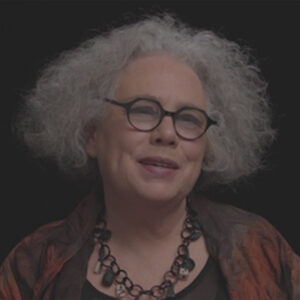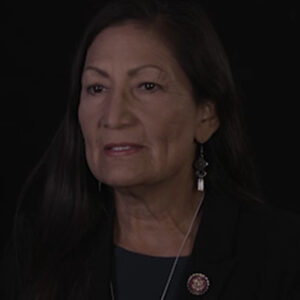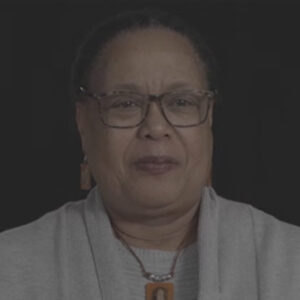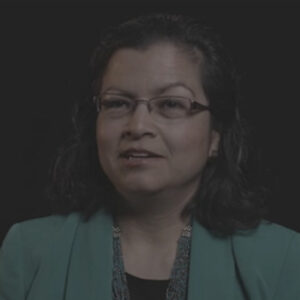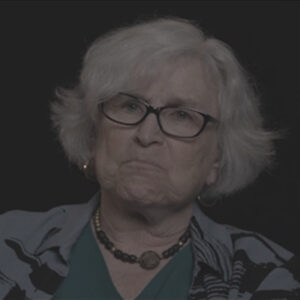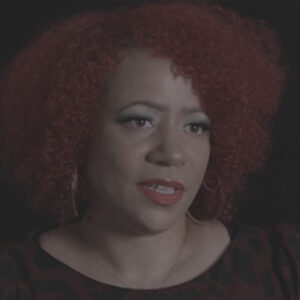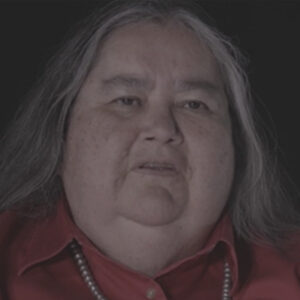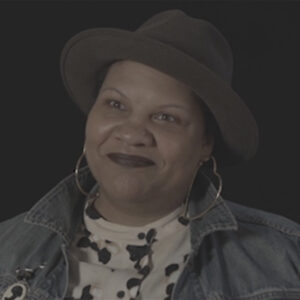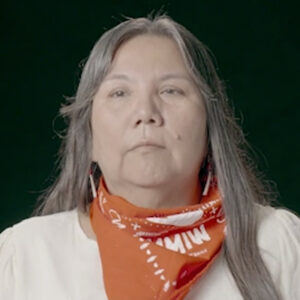Speaker My name is Nancy Unger, I’m a professor of history at Santa Clara University, where I’m the chair of the history department. And my specialty in American history is the long Gilded Age and progressive era at the turn of the last century.
Speaker Have you faced any challenges in your career as a woman historian, and if so? What have they been?
Speaker I’ve faced a number of challenges, my career, and it’s hard to know which ones were due to being a woman. But I do remember early on interviewing and having someone say to me, a department chair say to me, well, OK, so you can teach women’s history. I have no training in women’s history. At that time. I had I was I really took umbrage at this notion that as a woman, that would be the only thing that I could do. But then I realized that I was a good way to break into the business and I began teaching more women’s history. And then I really fell in love with it.
Speaker And I’m so glad I didn’t say, oh, no, I won’t. I won’t do that. But that was that was a frustration that that was the automatic assumption. I remember saying if I were black, would you say, oh, you’ll teach African-American history, you know, with that assumption. So that was a little a little frustrating.
Speaker Um.
Speaker Oh, when I was a lecturer many years ago at another university, there was a point where it might have been either me or a male lecturer who was going to get a permanent position. And one of the male professors said, well, the man should have it. He has a family to support. And I was outraged by this idea that I had nothing to do with our abilities, anything else, simply that he was a man that had a family to support. And so did you. Well, even if I didn’t. So what you know, it was you know, this should be determined by, you know, who going to be the best for the job. That’s what determines virtually every decision about about jobs. But in this case, it was very blatant that that was not the case.
Speaker Now, what is your connection to Janet? Well, Jeannette Rankin, yeah.
Speaker Jeannette Rankin is a really amazing woman in the period in which I study. And as as a scholar of the Gilded Age and Progressive Era and someone who does women’s history, you can’t do this without this amazing woman who is, you know, the only person to have voted against U.S. entry into both world wars.
Speaker I mean, she and she’s just it’s unfortunate that she gets so I mean, I just did it myself, pigeonholed her for, you know, for doing that when she did so much more. I mean, really, her greatest goal when she was, you know, starting out was women’s suffrage, one of the vote for women. But she’s come to be known much more for past, for being anti-war and for being a pacifist.
Speaker What I was trying to get at was that you are you the author of the American biography?
Speaker I am. It has been like very important, but that’s a fine. And I was I was able to write the entry for her in the I’m sorry, I American. I wrote the entry about her for the American national biography.
Speaker Really great. So as you know, this project’s title is unladylike. What does that mean to you?
Speaker I think the term unladylike is intended to convey this notion that at that period, women were not just told that they should be genteel and polite and really sort of the support staff for men and children. Wasn’t that they should be that way, that they naturally were that way, that this was the natural state for a woman was to be more sort of, you know, reserved and dedicated to others.
Speaker So to be unladylike was to challenge that. And I think we forget in our modern age how difficult that was to do that. That to in any time to push against the prevailing standards is difficult. But this was they were so embedded in American society.
Speaker So to be unladylike was to not just be concerned, not to be self-effacing, but to to to stand up for or even to fight for what for what you believed in, even if it meant not always being nice and not always being subservient and polite. And so it was it was really quite an achievement, I believe, to be unladylike in that period.
Speaker And how would you define it in today’s terms?
Speaker I think today it still means pretty much the same thing. I was thinking about this in my own life, and I was born in 1956, so I’m 63 years old.
Speaker And it was always very important to me that I be nice and that people like me. And that was really, really important. And later in my career, I started writing op eds and then I started having some political activities and I became very vocal about being pro-choice and a number of things that brought me hate mail and crank mail.
Speaker And and I learned that there are more important things than being nice and having everybody like you. But it was that was very hard for me to overcome that. Oh, someone will be mad. And it’s, of course, very rewarding. And I’m so glad I did it, but it was an extra challenge.
Speaker Thank you. So let’s move into the historical context. Guess what?
Speaker When was the word feminism first introduced?
Speaker Oh, you want it in the U.S. context, context, yes. So it first appears in English I’m sorry, the word feminism first appears in English in 1852 and it makes it into the Oxford Dictionary in the late eighteen hundreds.
Speaker But it really doesn’t come into, you know, sort of general parlance until like 18, 13, 18. I’m sorry, it doesn’t the word feminism doesn’t really come into general parlance in the United States until 1913, 1914, you know, around in there. But it doesn’t quite mean what we think of it as meaning today. It it’s still there was still that notion that, you know, women could and should be, you know, active in their own right. But it’s still sort of recognised that women were naturally, you know, quite different from men.
Speaker And there’s still that kind of ladylike sense that is still kind of attached even to the word feminism at that time.
Speaker Thank you so.
Speaker Looking back, we we we call this period the first wave of feminism, but the women who were active in that area wouldn’t necessarily have called themselves feminists.
Speaker I think in the I think in the what we would call the day, the first wave of feminism, there were a few women who were truly what we would consider feminist today.
Speaker But I think it’s really it helps us to understand how deeply embedded those ideas were, that it was women’s nature to, you know, support others. And they were fundamentally different from men than a number of ways that even people who consider themselves feminists then still carried some of those ideas.
Speaker So in just a few sentences, could you define for me the progressive era of progressivism and the progressives?
Speaker Where are you going to have to bear with me? I’ll do it as best I can.
Speaker But so the Progressive Era really is is developing in conjunction with what we call the Gilded Age. So in the Gilded Age, at the turn of the last century, we see like anything, it’s gilded. It looks great from a distance, look like gold. We have industrialization and urbanization and wonderful new products. And the United States is just booming. But if you scratch off that gold surface, we see industrial disease and overcrowding, political corruption, all kinds of major problems. So the progressive era is in response to that. And essentially the progressives are a group of people who say, look, what if we took the same drive and desire that is fueling all of this wonderful growth and productivity and focused not just on what how to make the most profit, but how can we make profit and still have things be humane and and decent so they don’t say, oh, we want to end capitalism, but they say we don’t think that capitalism is mutually exclusive with being with being humane. We can we can have a productive, profitable society and have politics that are pure, not corrupt, and have workrooms that are safe as well as productive. So they it really is part and parcel with the Gilded Age advances.
Speaker So the progressives are kind of trying to, you know, work work with that in tandem with that.
Speaker Perfect. You know, that was impressive. You touched on some of them.
Speaker But what were the main trend is occurring during this era at the turn of the 20th century?
Speaker It is astonishing when you think of how quickly this nation went from being primarily a rural agrarian nation to an urban industrial giant. I mean, it’s it’s just mind boggling. So the trends are really this tremendous growth in population, huge growth in population through natural increase as well as immigration, and just a very different way of living. So we see these these bustling cities filled with all kinds of new technology.
Speaker It’s just really an incredibly exciting time of year of growth and advancement in so many different levels, so many different areas.
Speaker Can you speak specifically to the rise of leisure and entertainment and and changing norms around sexuality?
Speaker And the one of the things that really changed is that I thought I don’t think it’s enough credit is the power of leisure that for the first time people are being paid in wages. They have cash in their hand and they usually have a day off. You didn’t have that on the farm, either of those two things. So there’s this recognition that, wow, this is really an opportunity for a huge industry. How will people spend their time, their leisure time and money? And so there’s a lot of debate about, well, how should they? Is it up to them?
Speaker Should they just go purely for pleasure?
Speaker We see the rise of these amazing amusement parks and Coney Island and we see dance halls and so forth new.
Speaker The new film industry is beginning. But then we also see some of the progressives are a little concerned about this.
Speaker Well, you know, is this just are we creating a society or a population that, you know, is is just sort of out for mindless leisure? Are should how should they be spending their time? Should they be going to museums and libraries and learning, you know, developing their communities? Should they spend that leisure time going to a labor meeting? I mean, there’s there’s a lot of questions about this. So it really is very. Very different than the old days where leisure time might be spent playing checkers or, you know, going to maybe the country dance, but now it’s an industry and this gives rise to things like the various urban baseball teams we have commercialized, commercialized leisure is is really one of the I think, one of the most fascinating aspects of this period.
Speaker And how about changing norms around marriage and sexuality?
Speaker The this urban industrial society also allows for some real changes in sort of marriage norms and and atypical sexuality. So in other words, in the more rural America, someone who had same sex desires might sneak off and have sex with someone of their same sex. But this isn’t a lifestyle. It’s really not possible.
Speaker You’re dependent on the nuclear, you know, heterosexual family with the rise of this urban industrial society.
Speaker When you get paid in wages, someone can what we would term a homosexual today can live alone, doesn’t have to get involved in a in a in a marriage and have children. We see the rise of what we would call today a gay lifestyle. This is certainly much more prevalent and possible for men, but it also exists for women.
Speaker There’s also a really unusual aspect for working class women who to live with another woman will sometimes pass as a man to women can’t live alone the way that two men could. They can’t make enough money because women are paid so much less. So we do see instances of women passing as men and living in these what appear to be heterosexual marriages.
Speaker Thank you. Tell me about the more reactionary aspects of the progressive era that. In our mind today, maybe so progressive thinking, you know, Jim Crow, eugenics.
Speaker I think it’s dangerous to romanticize the progressive era as these wonderful people who want to uplift everyone else because some of their ideas are are not truly progressive and actively hurt a number of people. This is the heyday of Jim Crow. And while we do have a few white progressives who are saying that racism is wrong and un-American, it’s almost always black progressives who are saying that this is an area where I think the the white progressives really fail.
Speaker And they also they so believe in the power of technology and science and experts. You know, they they really believe in experts. Will many of the progressive experts are saying, well, if we really want to improve society, we have to get rid of the inferior people. And so we will see the rise of eugenics, the idea that we can build a better society. And this means sterilizing people who are termed to be inferior from one way or another.
Speaker And almost all of these people who were forcibly sterilized are people of color or poor people, people on the margins of society and so forth.
Speaker So, I mean, this is this is a real failing of the progressives.
Speaker You mentioned mass immigration. Can you go more in-depth into the immigration patterns that were happening and the nativism and anti-immigration laws that were passed in reaction?
Speaker So the United States has always been a nation of immigrants.
Speaker But prior to the Gilded Age and Progressive Era, we see a lot of people coming from northern Europe. These are white Anglo-Saxon Protestants for the most part.
Speaker And there they seem to be sort of assimilating fairly easily into the mainstream population.
Speaker Most people are farmers with the urban industrial explosion. We see immigrants coming from all over the world. And these are very often not white Anglo-Saxon Protestants. We see a lot of Jews, more Asians are coming, a lot of different people, and they’re coming in massive numbers. And so on the one hand, the United States welcomes these people with open arms because they’re cheap labor. But there’s also real panic that, you know, what is going to happen to the United States with this deluge of people who are different. So there seems to be two responses. One is to stop this immigration, especially of people who are deemed less desirable and the other is OK that we have to assimilate these immigrants.
Speaker So there’s that notion that is the United States a a melting pot or a tossed salad. You know what? You just have all the things sort of in the tossed salad. Everybody’s there, but there are distinct flavors and so forth. And this was much more of the melting pot idea. No people should, you know, really conform and they should be they should learn traditional American ways and values.
Speaker So what did those Americanization efforts look like?
Speaker Some of the progressives are very involved in the settlement house movement. And so this is primarily run by women who are in these neighborhood settlements throughout almost all American major American cities. And many of these white middle class progressive women are really working to help these immigrants become good Americans and to teach them, you know, American ways and values. Some begin to recognize the value of these people on their own terms and what their cultures bring to enrich the culture of the United States. But I would say that there are a lot of movements in public schools, for example, to really work to discourage more traditional ways.
Speaker Theodore Roosevelt says, you know, there’s there’s no such thing as a hyphenated American.
Speaker You can’t be, you know, Polish American, a German American.
Speaker You should just be an American.
Speaker And so there’s a strong feeling that this is something that that assimilation is the is this is going to be the key to success for these immigrants.
Speaker Tell me briefly about U.S. colonialism and imperialism during this turn of the 20th century.
Speaker Wait just a minute, because we’ve got two loud car in the background. And Jesse, would you mind agreeing that sound barrier just in so doesn’t block the light? I think it would help just a little. We’re not really getting an echo, but I assure you, I keep coming here to come in and get as close as you can. Basically just tell me what to stuff and then push in a little, if you can.
Speaker Hey, good, how are we doing, wonderful thing. Oh, that’s great. Oh, I have, yeah.
Speaker So I know a little bit what you’re up against, trying to say something that you know so well and is so rich and bringing it down.
Speaker Yeah. No, I know if I talked more slowly I wouldn’t have so many ums and but then I sound like a robot so you just kind of have to be there with me, you know. Yeah. Great, great.
Speaker Yesterday I interviewed someone that so many lights in every sector. Oh no. It’s going to be harder. Oh yeah, yeah, yeah, yeah.
Speaker Now my mind just gets ahead of my mouth and. Yeah, yeah, yeah.
Speaker Well, good, good. So tell me briefly about US expansionism and colonialism during this period, the United States really prides itself on not being a colonial power.
Speaker There’s always this notion that we are expanding the boundaries of democracy, that when the United States expands, it just brings people into their you know, when we expand west, for example, we don’t create the West as colonies. We incorporate them into the into the United States and bring those people into citizenship and so forth, except Native Americans. But in any event, the United States does not like to see itself as a colonial power, as an empire. But in fact, during this period, it is we do have our own brand of American imperialism where we don’t, for the most part, take over the governments of other countries. But the United States is very active throughout the Caribbean.
Speaker In Latin America, it is it is working to buy cheap.
Speaker What am I trying to say? Cheap.
Speaker Does the United States is is very active in buying raw materials throughout throughout the country and then selling them out?
Speaker I’m sorry, the United States is very active in buying cheap raw materials in other countries, using that cheap labor, bringing those materials back to the United States and, you know, building manufacturing into something else and then selling it at a high profit. So the United States is, in fact, working as an empire.
Speaker It’s just it’s just not calling it that. The idea is more that, well, no, we’re just very active sometimes. You know, we say, you know, we were certainly not taking over government, but we are, in fact, influencing them in a large variety of ways.
Speaker You mentioned the Caribbean and Latin America.
Speaker How about the Pacific islands of Hawaii? Right, right, right, right. So the United States is very active financially in a large number of of countries and throughout the Caribbean, in Latin America and in what were then the Sandwich Islands, now Hawaii. We see the United States being very aggressive in, you know, really using the local cheap labor to provide us with the raw materials that the United States then manufactures into goods that are very high profit. So it is a type of an economic imperialism rather than a political imperialism. But we have a very heavy hand in a variety of these nations.
Speaker And that. Great.
Speaker Yeah, um, we’re certain groups of people made a particular target of of of the the various movements happening during the progressive era. What are we driving at here? Uh, well.
Speaker You know what, skip it, OK with you. All right, so let’s let’s turn our attention to art.
Speaker Describe what rights women did or didn’t have at the turn of the 20th century and and what opportunities they created for themselves.
Speaker So at the turn of the 20th century, women in the United States have a considerable number of rights compared to what had gone on before. We don’t have coverture anymore. In other words, you know, the husband doesn’t automatically own his wife, own their children, own any, you know, money that she earns and so forth. Women do have property rights. They do have they do have more rights than they’ve had in the past. They certainly don’t have the right to vote. They have the right to divorce.
Speaker But divorce is still a very rare thing and it comes with an enormous amount of stigma. But it is it is possible to to to obtain a divorce. What was the other thing you want to ask?
Speaker What educational opportunities?
Speaker Women do have educational opportunities. And throughout the United States, there is a pretty much equal effort to get boys and girls educated in the primary grades. Where things began to split is when it comes to high school and particularly in college. So those are reserved that more serious work tends to be reserved for boys and men. Now, a lot of women’s education depends on their class. So for if you are working class, primary grades are sufficient and then you should be going after after work for middle to upper class families. There are more opportunities for girls to have an education. But this particular type of education, it’s more the finishing school where one goes to learn how to paint China and speak French. And even in the what they call the seven sisters, the more serious women’s colleges that are beginning to develop the emphasis is that the parents would send their daughters there, not so they could become professionals, but so they would be better wives and mothers and community leaders. So, you know, there are there are there it’s not that there isn’t higher education for women, but it is not what we think of as a weight, as an entree into a paid profession. There are few professions for women that are acceptable. And there, of course, in the helping fields, teachers, nurses, librarians, this is the kind of work that is deemed acceptable for for women to be doing. Women’s highest calling is marriage and children. And since it is such a high calling, it should not be combined with the profession. That’s the one all consuming profession. So the idea was if a young woman became a teacher, that should be a an interim between her girlhood and when she becomes a wife and mother.
Speaker And this insistence that mothers not work was that particular classes or ethnicities or geographies.
Speaker Was that a widespread belief, the notion that women should not that I’m sorry, the notion that mothers should not work outside the home was ever present? I mean, it was omnipresent. There is this belief this should not happen. There was recognition, however, that for.
Speaker Is that like the handwrote and are we ready? Yeah.
Speaker The notion that mothers of young children that mothers should not work outside the home was pretty omnipresent throughout society. But there was recognition that certain groups this was just not financially feasible. It took the labor of everyone in the family to work so that if if a poor woman is working outside the home, she is not necessarily going to be looked down upon because she’s working outside the home, because it’s out of financial necessity where it became looked down upon as if it wasn’t out of financial necessity. So we see in various poor immigrant neighborhoods, in many African-American families, mothers are working outside the home without this enormous stigma. But there’s still the sense that, you know, it’s really best for the mother and the children. If mothers are a full at home full time, it’s a full time job.
Speaker Thank you.
Speaker Could you provide some statistics that demonstrate the ways we 60 the number of women in the labor force is expanding during this period, but it’s not expanding. It’s not exploding in the same way that. Well, that’s not what I want to say. OK, wait for this interruption. So it’s so hard to find a quiet place, you know, when you think something’s quiet until you get quiet and you’re like, oh yeah, NPR sent this guy over to my house to do an hour long thing on the 17th Amendment. And it was amazing how noisy my house is.
Speaker I realized I didn’t know it until the microphone. Oh, man.
Speaker Because I said I cannot I don’t have time to go to Stanford to send somebody to your house, but.
Speaker Oh, my God, unplug the fridge. Oh, no. It was just, you know, planes going over and then.
Speaker Yeah, it’s very good. Now we’re totally OK. Great.
Speaker So so in the United States, more women are working it, the percentage of women working rises from about 15 percent in 1870 to about 24 percent in 1920.
Speaker So that’s a big increase.
Speaker But that’s still, you know, less than three quarters of American women.
Speaker And this includes African-American women who are working outside the home in much larger numbers.
Speaker So it really tells you how much there was a taboo, this notion that women should not work outside the home except out of financial necessity. So, again, that’s an increase in numbers. But it’s not like all women are racing out and be accepted in in, you know, in a variety of jobs.
Speaker And what kinds of professions are they entering?
Speaker The the professions that women enter, of course, are based on their class and their race and their level of education. So at the at the very top, we have the women who are truly professional.
Speaker These are the the college professors, the librarians, teachers, nurses and so forth. Then there’s a lower level that still better paid than the factory workers. And these are women who are working the switchboards, who are working the counters in the new big department stores in a number of those kinds of jobs than at the bottom we have well, and lower than that, we have women working in factories and they may be working alongside men, but they’re paid substantially less solely because they are women. But those jobs, I think many people think of, oh, that’s the lowest of the low. Well, those were prized jobs. African-American women could not get those jobs. For example, they’re in the lowest levels of being domestic servants or working in the fields, you know, doing doing agricultural work. So there are there are also women who do what is called piecework. So you’re paid by the piece.
Speaker So if a factory is making glove’s, for example, they would bring a huge, huge bundles of gloves to your house. And you would because they’re sewn inside out and you would turn them rightside out or you get a fraction of a cent per piece or you would decorate hats. Sometimes we have we see women and all their children working together for this piecework. So it’s very labor intensive and pays very, very low wages. So there’s a big range of work that women are doing.
Speaker A lot of the women that we’re featuring are or in some ways, firsts. Why do you think that is? Why why there so many firsts happening?
Speaker This is an era of firsts, I mean, it is just such a different period than what we’ve seen prior to this and in American history in this urban, industrial, new urban industrial environment. There are just so many opportunities and for women that many of the women of the progressive era, I think are very crafty.
Speaker They don’t stand up and say, you know, I’m going to do this and I’m going to seize these new opportunities. It’s very often couched in terms of, well, as a woman, I you know, I know that society is right, that I am the nurturer and the the helper and the altruistic person in in this culture. And therefore, I have an obligation when I look around and see that there’s this child labor, that there are issues and there’s impure food and milk and and so forth, rather than saying, you know, I’m a woman or I’m going to go out there and do reform, it’s like my as a woman, I have no choice. I must carry out my, you know, my God given obligations to be an uplifter.
Speaker So we see a lot of women, you know, entering into all kinds of arenas, reform arenas, leadership arenas that they were not that they had never done before, but they do. So I think in a way that allows society to to accept this less.
Speaker But again, yeah, it was an interruption wasn’t actually anticipated. My next question.
Speaker Oh, OK.
Speaker You want to start with that question and I’ll see if I can fold it in.
Speaker Well, it’s twofold. So, first of all, tell me about the prevailing stereotypes and notions that that limited women’s abilities and then how they in your own words. Took that perception of natural caregivers and used it to liberate them, right?
Speaker So the prevailing stereotype was that women were naturally subservient and caregivers and pure and sentimental.
Speaker They’re good people, but they’re they’re kind of weak in the sense that they don’t have that aggressiveness and assertiveness that men men have. And so I think that the women, many progressive reformers are successful because they use those stereotypes to their advantage and say, well, you know, I really you know, I I don’t want, of course, to put myself in the limelight or take on the aggressiveness of a man. But as a woman, when I look around and I see that we have impure food and drugs, you know, especially milk that I, you know, feed to my children when I see the corrupt politics, when I see that our environment is being destroyed by the aggression of the aggression of men who have to make a profit for their families.
Speaker Men have to do what they have to do. But, you know, I am called by my sphere as a woman to take action.
Speaker So I think they’re very shrewd and not saying I’m rejecting these prevailing stereotypes. They’re just saying, yes, it’s true.
Speaker And as a woman, what kind of a woman would I be if I just sat home and allowed child labor to continue on to allow all of these problems to go?
Speaker It is my obligation as a woman to become involved and to try to help.
Speaker So what did these Refah what form did these reforms take? What were some of the movements that women?
Speaker Got involved. So women take this moral authority that they have as women and they get involved in a lot of different things. Often it was couched in terms of the home. Well, I can’t take good care of my children if I can’t be sure that they have pure food.
Speaker We have pure food on the table, I, I can’t take good care of my children. If the building I live in is a firetrap and no one is taking care of this, I have to look out for my sister workers who are living and who are working in terrible conditions that give rise to things like the triangle factory fire, just like, you know, no, no, no, no, no.
Speaker As far as women, we must be involved in these kinds of things. And we bring that purity as women to this. No one can say, oh, she’s being involved. She’s trying to make money. She’s trying to be power hungry. As long as it was altruistic, it was a good way for women to attack a variety of things. And so many women say, look, to do this, we really have to have the vote. And they say they’re not demanding the vote on the basis of equality for the most part, although some are. But many are saying women have to have the vote in order to do the work that is cut out for us, you know, within our sphere.
Speaker So women’s suffrage is going to be one of the one of the things they’re really going to be working for.
Speaker Well, what other things are they working for? Temporariness, like you mentioned, anti lynching campaign. You could kind of rattle off. All right.
Speaker So women get involved in a whole variety of things and their interests depend, I think, a lot on their race, where they are, their class and so forth. But certainly we’ll see many African-American women getting involved in anti lynching campaigns. We will see others getting involved in real concern about nature and the environment and how, you know, what’s happening to natural resources that are just being, you know, sold for their monetary value. We’ll see others getting involved, very involved. They’ve been involved for a long time in the temperance movement. And I say alcohol is really destroying much of our our society. It’s the root of so many problems. And so women have to be they must be leaders in that in that movement.
Speaker What did I forget pretty much about suffrage settlement houses, trade unions?
Speaker Oh, yeah.
Speaker Of course, women are also going to be very involved in trade unions and basically labor issues overall and saying, you know, look, we are as mothers and as, you know, the upstanding members of society. We are very concerned about economic justice. We’re concerned particularly about the the women and the children working in these factories that they don’t have any rights and that this is we’re creating these these permanent classes in our society. What has happened to the American dream? And so it’s our job to to help with that. They’re also working, although with, I think, less success, but trying to go after political corruption in the various cities and talk about how none of these reforms were easy.
Speaker And none of these changes in expanding of women’s sphere can easily.
Speaker Reform in general doesn’t come easy. And it’s hard enough for the male reformers who are accepted, as you know, should be leaders in reform. For women, it is much harder, even though they’re couching it in these terms of, well, I’m just doing my job as the woman many come up against. This will go home. You know, you should be in the home no matter how.
Speaker Yeah, helicopter. It’s not just your house. Yeah. Yeah, the whole world.
Speaker Yeah. Boy, that is one of you said you don’t you don’t know it until you’re trying to do this. Yeah.
Speaker Even deserts are loud.
Speaker Yeah. I’ve having traveled with our university is right next to the San Jose airport and so you know it’s really bad.
Speaker We’re glad you’re OK. What was the question, what barriers they run up against?
Speaker So reform is always hard and even men who are accepted as reformers are running up against a lot of opposition at this time. But for women, they’re running up in some of the same opposition from big business and others in power who don’t want to have that disrupted. But they’re also running up against this notion that as women, they shouldn’t be doing this.
Speaker And even though they’re playing the well, being a woman demands that I do this, they’re still very often met with this is not your business. Go home. Women are too weak. They’re too sentimental. They don’t really understand all of the intricacies.
Speaker There are many ways that are used to discredit women reformers based on these perceptions that, you know, that women just really don’t have what it takes. They’re well intended, but they really aren’t qualified to take on meaningful reform.
Speaker Can you very briefly describe the specific 60 Minutes on this section, on this section? Oh, I agree that you’re doing great.
Speaker Good for us, Jake.
Speaker But if you’d like, can you briefly describe what you touched on it earlier?
Speaker But the experiences of African-American women broadly, I know it varies dramatically. The.
Speaker For African-American women, this is just not a good time to be an African-American woman, and certainly there we have the problem of legalized segregation with Plessy versus Ferguson. But, you know, even even without that, there were very limited opportunities for African-American women. There are very limited opportunities for African-American men. But women really are relegated for the most part to a domestic work and field work.
Speaker There are, however, there is an African-American middle class. And so we do see African-American women in certain professions, including nursing and teaching. And we certainly see African-American women very dedicated to the same progressive causes that that that white women are involved in. And they are also they’re concerned about education, they’re concerned about voting, and they’re concerned about temperance. And they’re also concerned about the kinds of issues that are really affecting their race, particularly lynching. And I would just add here, because it always confuses my students, how could lynching be legal?
Speaker Isn’t murder. So what they’re looking for is a federal lynching law. When someone is lynched in a Seminole County, the local police don’t do anything about it. So what they’re really striving for is a federal lynching law that will have teeth in it, that will bring federal authorities in when there is a lynching to actually try to, you know, prosecute.
Speaker That both new and.
Speaker Can you describe the specific experience of Asian-American women at this time, Asian-American women are in a real minority and of course, it really depends on where you are. And are you Chinese or are you Korean? Are you? I mean, there’s a whole range of experiences. Are you third generation?
Speaker Yeah. Are we done?
Speaker No, not quite. No. And you probably want to start that sentence.
Speaker Yeah, I will still know. OK.
Speaker Thank you for your patience. Oh, sure.
Speaker Where are you going to do when you’re idling and not driving the way you run out there to determine if I can do that might sometimes trucks will lead their trucks and it’s like not for anybody.
Speaker If it doesn’t go away soon, you can fix it in post, but better to not fix it.
Speaker I think, Jose, go out there, kick some ass.
Speaker Yeah, yeah.
Speaker My building is not air conditioned. It was built right after the 1986 earthquake on campus building on campus. So they have all these, I think, a lawn in front of my building and they bring all the kids in daycare over to play in the lawn. So I’m now that old lady who says you can’t get off my lawn.
Speaker I walk in here. Shut up.
Speaker I love it. That’s great. I know, like.
Speaker Yeah, exactly. Well, all the other buildings are, you know, they’re air conditioned. They’re hermetically sealed. I have my windows open, you know. Yeah.
Speaker And there’s classes in there too.
Speaker It’s bad now and I can still hear if it’s not. But it’s low enough you can get rid of those.
Speaker Oh.
Speaker So here, it’s pretty to, uh, I think so, anyway, great, by the way, Jose. So, yeah, OK, I’m back there is one here. Yeah, but it’s difficult.
Speaker Oh, Jesus.
Speaker That’s quiet now. Thank you, Jose.
Speaker She got locked out. Oh, no. Oh, no. Oh, no. Sorry. OK, no, it’s OK.
Speaker For Asian-American women suffer a variety of unique discriminations as well. And it really depends on where one is. If one is Japanese or Chinese or so is really the lot. Let me try that again. Asian-American women face a variety of discriminations as Asian-American women face discrimination and they are a tiny minority, which is really works against them. And there are a lot of varieties. It really depends on whether one is first generation, second generation, third generation. Has it been an effort to assimilate? Is it impossible to assimilate? But like African-American women and other groups of oppressed women, we do see that that progressive notion doesn’t escape them either. And so we do see some Asian-American women’s societies that are also working on local community uplift. So it’s one of the things that is really remarkable, I think, about the progressive era is that it it it’s pretty pervasive. And even if it wasn’t intended, even that rhetoric wasn’t intended to reach women of color. It reaches them. And so they’re playing the gender card. There’s like, yes, we are women. You’re absolutely right. We need to be we have the moral authority to uplift. And they they take advantage of that.
Speaker Other propeller plane is. And the studios have some protection. All right. It sounds like it’s clear. So we can keep Latino Latina women.
Speaker Latino women face many of the same discrimination that other women of color are facing.
Speaker They don’t know what to say about Latina women that I haven’t said. Should I just say it again? Are you looking for something?
Speaker Well, I’m thinking specifically because. Hoping that it will be. Yeah. You know. The Mexican I think most people don’t realize the Mexican American community also is facing segregation and lynchings.
Speaker OK, all right. Got it.
Speaker The Mexican Mexican-American women know we want to say Latino.
Speaker I guess it’s more broad, but. All right, whatever you say, OK, it’s all right for Latino women.
Speaker Of course, it depends on where they are, how many generations and they are and so forth. But they are facing, you know, high levels of discrimination as well. A lot of, you know, being segregated into certain areas.
Speaker Mexican Americans in particular face lynchings and again, high levels of discrimination, economic discrimination, educational discrimination and so forth.
Speaker And once again, the women, many Latino women are not saying, oh, that progressive rhetoric doesn’t apply to me. They’re saying, yes, I’m a woman and they’re going to play the gender card and say, yes, you know, I have no choice but to work to uplift my people and to attack some of this discrimination as wrong. So so they are going to be they’re going to be various Latino women who are going to be part of progressive reforms as well.
Speaker Native American women.
Speaker I have in my notes who, boy, the Native American situation is, I think, one of those o negative aspects of of progressive era notions.
Speaker So the idea was to to save the Indian, you needed to kill the man who are, you know, more broadly kill the person. So we see that Native Americans are actively being discouraged, prevented, prohibited from practicing their traditional ways. The idea was that those ways aren’t going to be sustainable and so they must assimilate. So this is going to be really difficult for Native American men and Native American women. And we see, as in every other case, Native American women are not hearing that progressive rhetoric and saying, oh, this doesn’t apply to me. They’re saying, yes, I will play the gender card. And I believe that I need to work to defend my culture, to defend the right of my people to exist. And so they will be they will be active as well.
Speaker And finally, gender nonconforming when we touched a little bit.
Speaker Right. I can hit it again if you want, by gender nonconforming. Are you talking specifically about women passing or do you want talk about lesbians with lesbian or bisexual?
Speaker You know, I was using it as a broad term, but what would you the queer women.
Speaker So women who were who were LGBT, do you want the Broadridge separately? OK, I could you I can talk about Boston marriages here. I think this is a good thing to get out. OK. All right.
Speaker So.
Speaker One of the things that is really fascinating about this period is the rise and then sort of the fall of the the Boston marriage. And the idea is this. We have women who today we would recognize as lesbian who, you know, let’s try this again.
Speaker At the turn of the century, we have a number of women who, particularly of the upper classes, who have the higher education but who don’t want to become just better wives and mothers because they’re educated, they want to pursue careers.
Speaker Now, it is unacceptable for a lady to live alone or to walk the streets alone. It’s simply not done. And so we see a number of women entering, entering into lifelong partnerships. And these are referred to as Boston marriages, because so many of these women came out of the elite women’s colleges that were around the Boston area. So some of these women are clearly lesbian. We know this from the letters they’ve left behind, diaries and so forth, but we can’t assume that they all were because it was the only way for women to not marry and to live out a career. But it is so it it’s a really interesting phenomenon that is entirely closed to working class women.
Speaker So if a working class woman does not want to marry and have children, she is it’s going to be much harder for her to be able to do this.
Speaker She can’t enter a Boston marriage with another woman because working class women don’t make enough money, even with their salaries combined to be able to live in this way.
Speaker And so we do see and we don’t have a lot of evidence of this, but there are cases that have been carefully studied of working class women who one of the one woman will live as a man, she will pass as a man, and they are therefore married. And then this allows both of them unique opportunities. They don’t have to have children. The wife doesn’t have to be subservient. They can live in an acceptable way, an acceptable community. Some of these couples are clearly lesbian. We know from their diaries and letters and others are you know, it’s really it’s hard to know. But if you’re a working class woman and you don’t want to be a wife and mother, this is about your only your only way out. So we do see examples of this.
Speaker So I think I think I think most of these are people that we would call, you know, queer, you know, or trans today, but not every not every one of them.
Speaker Right. Tell me about how the western part of the US was a vanguard for women’s rights and why you think that might be the case.
Speaker The American West is, although it’s depicted as the land of cowboys and virile masculinity and so forth, is much more welcoming of women and women’s suffrage than the more established East. And most historians would argue that is because the West was settled primarily by men and they didn’t make their fortunes and then go back to the east. They’re stuck out there and they want more women. They want to, you know, to have it be much less of a male dominated society. So there are they’re trying to create more incentives for women to go out to and to settle in the West. And so they’re advertising, you know, for women to come and to be teachers and do some of the other more traditional, you know, female, you know, activities. And to sweeten the pot, we see them early on granting women the vote.
Speaker Isn’t there also an element of trying to reach a population growth that would make them eligible for statehood?
Speaker The the in the West, there is a desire in most areas for statehood, and you have to reach a certain level of population for that to happen. So this is another reason that women are going to be courted. They’re going to be you know, there’s a big desire to have women to come out out of the West and to stay home.
Speaker So our broadcast is going to serve, as mentioned earlier, something about women who were active in politics and activism.
Speaker Mm hmm. Just about as good as the first state senator.
Speaker Mm hmm. Uh, sure. A lot of bass, who was primarily a journalist and publisher of the California Eagle, but later in her career, runs for office. Mm hmm. The first vice president, presidential candidate, uh, actually, quick aside, was a collection in L.A. last week looking at her paper. Yeah. And found.
Speaker Don’t like the ballot. Cool.
Speaker Cool. Oh, that’s great. That’s great. Yeah.
Speaker Yeah, I love doing archival work, it’s just like, oh, shit, look at this is a letter from Helen Keller. Yeah.
Speaker Mary Church, Terrell or Terrell.
Speaker We still haven’t decided how to pronounce it.
Speaker Oh, I’ve always said Terrell, but that doesn’t mean it’s right.
Speaker Some of the stories we’ve spoken to say Terrell, OK, Terrell either claim Kilani and the Collishaw briefly, you know, with those women. Hmm. I know it’s asking you to make a generalization, but how did the women such as these really shape American politics? And at the turn of the 20th century and and, you know, some were working within the establishment and some without kind of reflect on.
Speaker Let me just kind of as a blur and you can tell me what you think. So I think what’s really impressive about this group of women is that it’s such a variety of women and all of them, in one way or another, are using those sort of traditional notions about women and their obligation to uplift and to help. And they’re using that very effectively. But I think it’s also particularly impressive what they are up against. I think it’s hard enough to be a white woman trying to do this. Many of these women are really having to struggle against very pervasive racism. And so I think that this is all the more remarkable that they are able to because they’re having to deal with both gender and race in not peripheral ways, but really, really central to what they’re doing and the opposition that they’re facing. So I think that this is this is really quite, quite remarkable. I think another thing that really binds these women together, a quality that they share, is that they really do have enormous courage. I think that, too, I think it’s hard enough for anyone to really step up and take criticism and try to create meaningful change. I think when so much of society is against you from the onset simply because of your your race or your sex, to be able to say, yes, I’m going to really take a lot of criticism. It’s going to be very, very difficult. And I’m going to do this because it needs to be done. And I’m going to really have to work very hard to break barriers and to make my voice heard and to not give up. And because, you know, these women are going to face an enormous amount of criticism, the big efforts to to silence them, tell them to go back to their rightful place and so forth.
Speaker And I think that that they really show enormous fortitude.
Speaker And so I think that that is it’s really quite remarkable what they were able to achieve.
Speaker OK, great. Is there anything else related to the progressive era or the context more broadly that we didn’t touch on that you’d like to add?
Speaker I guess I would say one of the things that I like so much about the progressives is this notion that.
Speaker More for the greater good and less for the powerful few, and I really like that, that there’s just this notion that we should have a more equitable distribution of wealth and power in this country. The progressives aren’t socialist. They’re not communists. They we want to remain within the capitalist system.
Speaker But they really say, you know, we can’t we need the government to become more involved. In the old days, we all lived on farms. You knew what was in the food that you fed your family. Now you don’t. We need the government to regulate that. There’s a real problem. We always said that in the United States, if you worked hard, you were a good person. You could rise up to sort of the American dream. Well, during the Gilded Age, we have all these people there are working hard. There are good people, but they are not rising up. They’re being ground down. And so there’s this notion that, you know, we have to live up to our ideals. And that’s going to require that we that we need more regulation and we don’t want government to regulate everything. But we can’t just have this laissez faire system. It is not working and people are suffering. And I think that that is in a nutshell what they’re about. And it’s it’s it’s a really sort of basic philosophy that I think we’re still, I think, trying to implement today and still struggling over even today.
Speaker So what accomplishments happened during this era that we still benefit from today?
Speaker I think that we take so much for granted that was established at that time.
Speaker And when women do get the vote, we do have pure food and drug laws. We do have much better safety legislation. We have environmental protections, national parks. I mean, these are I mean, any one of those I think is an amazing achievement. We have lots I mean, I think we’re still fighting the battle on political corruption, but the old very open, you know, political bosses who basically, you know, who are this, you know, what is the what am I trying to say?
Speaker What was Boss Tweed saying?
Speaker Oh, we don’t have Boss Tweed anymore saying, well, yeah, it’s honest graft. I mean, yeah, you know, you pay me for political favors and I grant them and, you know, what’s the problem that may still be going on, but it’s at least not so out in the open anymore.
Speaker We do have laws about lobbying. We do have a number of regulations on business, on banking, on, you know, on any number of things.
Speaker So the progressives weren’t perfect and they don’t they didn’t say that they were perfect and they were going to fix everything. But they but they really tried. And they did make some real changes that we benefit from even even today.



